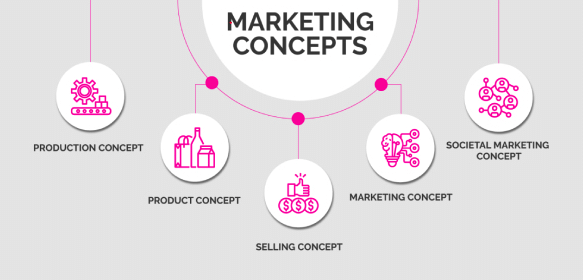Marketing: Concept & Approaches | Crash Course for UGC NET Commerce PDF Download
| Table of contents |

|
| Marketing Concept |

|
| Advanced Concepts and Approaches in Strategic Marketing Management |

|
| Fundamental Concepts and Approaches in Marketing |

|
| Types of Marketing Concepts |

|
Marketing Concept

The marketing concept is a business philosophy that places the customer at the center of all organizational processes. It suggests that companies should not only fulfill customer needs but also exceed their expectations to achieve their business goals. This approach is rooted in the belief that by prioritizing customer satisfaction, a company can gain a competitive edge and secure long-term success.
Advanced Concepts and Approaches in Strategic Marketing Management
- Strategic marketing management involves the planning, execution, and evaluation of marketing strategies to meet an organization's objectives.
- It requires analyzing the market and competition, understanding consumer behavior, and making strategic decisions.
- This comprehensive process ensures that a company can deliver unique value to its customers and achieve sustainable growth.
- Customer value-based marketing emphasizes delivering superior value to customers for competitive advantage.
- This approach recognizes that customers make purchasing decisions based on their perceived value, which includes product quality, service, brand reputation, and price.
- By understanding what customers value, companies can differentiate themselves in the market and build customer loyalty.
- Integrated marketing communications (IMC) highlights the importance of a consistent brand message across all marketing channels.
- This approach leads to stronger brand recognition, trust, and loyalty.
- Customer relationship management (CRM) focuses on developing long-term relationships with customers.
- CRM involves using data to understand customer behavior and needs, allowing for personalized marketing efforts and effective loyalty programs.
- This results in higher customer retention and profitability.
- Strategic brand management centers on building, measuring, and managing brand equity.
- This involves creating a strong brand identity and continually enhancing the brand to maintain its value and relevance.
- Data-driven marketing relies on analyzing large volumes of data for informed marketing decisions.
- This approach enables accurate market segmentation and personalized marketing efforts.
- It is driven by advanced analytics, artificial intelligence, and machine learning technologies.
Fundamental Concepts and Approaches in Marketing
- Marketing is a multifaceted field focused on creating value for customers.
- It fosters strong relationships between buyers and sellers.
- The central idea of marketing is to exceed customer expectations to achieve corporate objectives.
- Emphasis is placed on customer satisfaction, which leads to loyalty.
- Satisfied customers contribute to long-term success.
- A foundational approach is the product-oriented approach.
- This method focuses on creating a high-quality product.
- It can be effective in unique markets but may struggle in saturated markets.
- The sales-oriented approach is centered on selling and promoting products.
- Aggressive sales efforts aim to drive product sales.
- This can lead to customer dissatisfaction if needs are overlooked.
- The market-oriented approach emphasizes understanding target market needs.
- It develops products or services that meet customer needs.
- This approach helps companies stay attuned to market preferences.
- The societal marketing concept introduces ethical considerations in marketing.
- It advocates for meeting customer needs while contributing to societal well-being.
- The marketing mix, or 4 Ps, is fundamental in marketing.
- It guides decisions about product, price, place, and promotion.
- The marketing mix helps implement marketing strategies.
Types of Marketing Concepts

Marketing concepts are fundamental philosophies that guide a firm's approach to marketing and how it interacts with its clients. Over time, several different marketing concepts have emerged, reflecting changes in market dynamics, client behavior, and business plans. Here are some of the key marketing concepts:
Production Concept
- The Production Concept focuses on maximizing production efficiency and lowering production costs. It operates on the belief that clients prefer products that are widely available and affordable. This concept is particularly suitable for companies experiencing high demand exceeding supply, aiming to produce goods in large quantities to meet this demand effectively.
Product Concept
- The product concept revolves around emphasizing the quality, features, and performance of a product. It assumes that customers are inclined to choose products that offer the highest quality and most features.
- Companies embracing this concept tend to heavily invest in research and development to craft innovative and superior products.
Selling Concept
- The selling concept is grounded in the belief that customers will not naturally buy a product or service unless they are actively persuaded to do so.
- Businesses following this concept concentrate on promotional and sales activities to influence customers into making a purchase decision.
- This approach is commonly observed in industries where there is intense competition and products may not be in high demand.
Marketing Concepts (Market-Oriented Concept)
- The marketing concept emphasizes understanding and fulfilling customer needs by providing superior value. This involves analyzing customer preferences, customizing products and services, and fostering strong customer relationships.
- In this approach, the primary focus is on customer satisfaction and long-term customer relationships rather than short-term sales.
Societal Marketing Concept
- The societal marketing concept expands upon the traditional marketing concept by considering not only customer needs but also the well-being of society as a whole.
- Companies following this concept aim to create products that not only meet customer needs but also contribute to societal welfare.
- Businesses embracing the societal marketing concept take into consideration ethical and environmental concerns in their business practices.
Holistic Marketing Concept
- The holistic marketing concept integrates various marketing activities and approaches, recognizing that marketing affects more than just the marketing unit. It considers all stakeholders, including workers, clients, and partners.
- This concept stresses giving value through multiple channels and touchpoints, aligning marketing efforts with the overall corporate strategy.
Relationship Marketing Concept
- Affinity marketing focuses on making and sustaining long-term affinities with clients rather than one-time trades. It stresses client loyalty, repeat firm, and referrals.
- Customer relationship management (CRM) systems are often used to perform affinity marketing plans.
Digital Marketing Concept
- In the digital marketing concept, the main focus is leveraging digital technologies and online channels to connect with clients, which is crucial in today's digital era.
- This approach entails strategies like content marketing, social media marketing, email campaigns, and search engine optimization (SEO).
Experiential Marketing Concept
- Experiential marketing revolves around crafting distinctive and immersive brand experiences for customers, moving beyond traditional advertising to engage emotions and senses.
- This concept finds application in diverse areas such as event marketing, pop-up stores, and interactive promotional events.
The selection of a marketing concept depends on various factors including industry characteristics, customer preferences, competition, and societal trends. Successful companies often blend elements from different concepts to cater to the varied needs of their target demographics.
Conclusion
The different approaches to marketing, whether product-focused, sales-focused, market-focused, or societal marketing, are key principles necessary for effective marketing management. While each approach has its strengths and is suitable for various business situations and objectives, they all share a common theme: a dedication to meeting customer needs. Contemporary marketing is increasingly moving towards a customer-centric model, emphasizing the establishment of long-term relationships and the delivery of exceptional value to customers. Companies that adeptly apply these marketing concepts and strategies are poised to experience sustained growth and profitability.
|
157 videos|236 docs|166 tests
|
FAQs on Marketing: Concept & Approaches - Crash Course for UGC NET Commerce
| 1. What are the key concepts of marketing? |  |
| 2. What are some advanced marketing approaches businesses can use? |  |
| 3. How can businesses effectively implement user-generated content (UGC) in their marketing strategies? |  |
| 4. What are some benefits of using advanced marketing approaches in business strategy? |  |
| 5. How can businesses measure the success of their advanced marketing approaches? |  |















